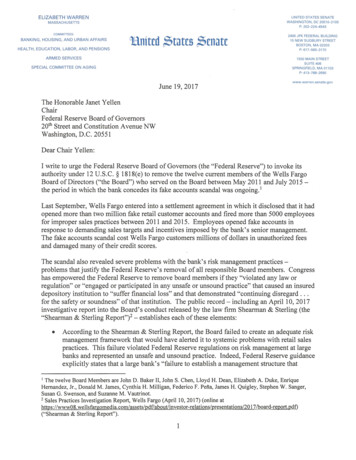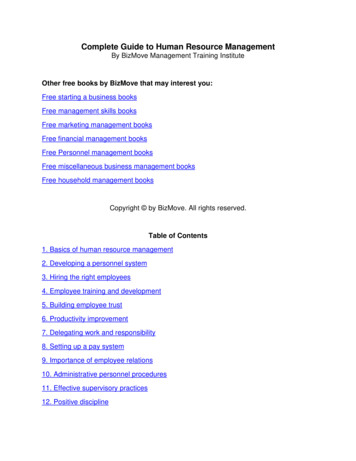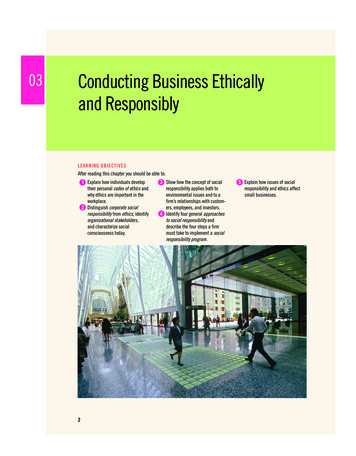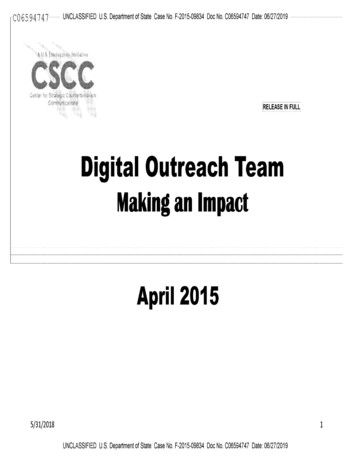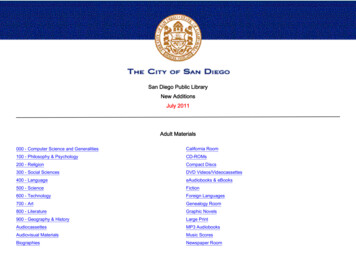
Transcription
18Free Will: The Scandal in PhilosophymChapter ibilapmoncHard owNarrolismibissoImpdelan MoValeriismrmineteDtilismatibpmocInilismatibpmoct InSofilismbitapncom nce)IecrSouqueeSla(Actudetimiith Llwedoge MatSowTyLeewaa(AlternThis chapter on the webinformationphilosopher.com/freedom
minismretIndeFreedomFreedom19smniairatribeLChapter 3Freedom is the property of being free from constraints, especially from external constraints on our actions, but also from interusalnal constraints such as physical disabilities or addictions. PoliticalaCtn limits togethefreedoms, such as the right to speak, to assemble,Aandgovernment constraints on associationsand organizations such asal of externalsuamedia and religions,areexamplesfreedom.CntevEIsaiah Berlin called this kind of freedom “negative” in hislessay Two Concepts of Liberty.CausaNon-I am normally said to be free to the degree to which no manor body of men interferes with my activity. Political liberty inthis sense is simply the area within which a man can act unobstructed by others. If I am prevented by others from doing whatI could otherwise do, I am to that degree unfree. 1SFAlismibitampncoBroadityusalaCtfSoPhilosophers call this absence of external and internal constraints “freedomtibilisofmaction.” But there is another, more philoapismnmairnco form of liberty that Berlin called “positive freedom.aIsophical”tberiSoft LI wish to be the instrument of my own, not of other men’s, actsof will. I wish to be a subject, not an object; to be moved by reasons, by conscious purposes, which are my own. I wish, aboveall, to be conscious of myself as a thinking, willing, active being,bearing responsibility for my choices and able to explain themby references to my own ideas and purposes.2smianiratreibst LModeCogitoariaertbiLtfg SoDarinm of positive liberty raises the ancient question of “freeiliskindThisbitapofs)will.” One can be free to act, that is, be free of con- ismIncom domcetheneuqe straints, but one’s will might be pre-determined by eventsinmtheinSreevtiteapast and the laws of nature.IndismnimrteDedetimind LQuite apart from whether we are free to act, are we free to willour actions?This is the question that philosophers have not been able toresolve in twenty-two centuries of philosophical analysis.12aBerlin (1990) p. 122. This is sometimes called “freedom from.”Berlin (1990) p. 131. Sometimes called “freedom to.”
20Free Will: The Scandal in PhilosophyChapter 3This book is based on parts of the Freedom section of the website Information Philosopher, a critical study of the “problemof free will.” (www.informationphilosopher.com/freedom)Those parts of the Freedom section that could not fit in thisbook will appear in two forthcoming volumes. Free Will: The CoreConcepts will include the web pages devoted to over 60 criticallyimportant concepts needed to understand the free will debates.Free Will: The Philosophers and Scientists will excerpt the I-Phiweb pages on 135 philosophers and 65 scientists.There I have researched the arguments of hundreds of philosophers and scientists on the question of free will, from the originalphilosophical debates among the ancient Greeks down to the current day. They are presented on my I-Phi web pages, with somesource materials in the original languages, for use by students andscholars everywhere, without asking me for permission to quote.Some readers might want to skip ahead to Chapter 7, the Historyof the Free Will Problem. There you can try to develop your ownideas on how and why this problem has been thought insoluble,even unintelligible, for over two millennia.If you don’t mind being biased a bit, and would like a littleguidance as you try to make more sense of the problem thanhundreds of great thinkers have been able to do, I present brieflyin this and the next chapter two of my ideas that you may want tostudy first and have in mind as you read the History chapter.The First Idea - against libertarian free willThe first is a very strong logical argument against libertarianfree will that I have found again and again in philosophy sinceancient times. I call it the standard argument against free will.If you fully master the standard argument, and perhaps evenlearn to detect its flaws, you will be more likely to recognize it inits various forms, and under a wide variety of names.I believe that the standard argument was the main stumblingblock to a coherent solution of the free will problem long ago.
In the next chapter, I provide examples of the standard argumenttaken from the work of over thirty philosophers, from Ciceroto Robert Kane, over twenty-two centuries. I am sure there areothers. Perhaps you will come across them in your readings. If so,I would very much like to hear from you about them.The Second Idea - for libertarian free willThe second thing you might want to keep in mind is what looksto me to be, after twenty-two centuries of sophisticated discussion,the most plausible and practical solution to the free-will problem.Please excuse my hubris to think that I have solved a 2200-yearold problem, one that has escaped so many great minds. DespiteJohn Searle’s cry of no progress, I have found steps toward thesolution in nearly twenty fine minds. They just failed to convincetheir contemporaries, and I find that few of them have read theirpredecessors as carefully as I have. 3If you don’t want to be aware of my opinions before you begin,just skip ahead to Chapter 4 for more on the standard argument.Almost all philosophers and scientists have a preferred solution to any problem. It very likely biases their work. You almostcertainly bring your own views to all your reading and research. Ifyou want to read the free will history unbiased by my views, skipto Chapter 7. If you want a brief introduction to my libertarianfree-will model before proceeding, read on.3If you don’t remember the past, you don’t deserve to be remembered by the future21Chapter 3Freedom
22Free Will: The Scandal in PhilosophyTwo Requirements for Free WillChapter 3Any plausible model for free will must separately attack the twobranches of the standard argument against libertarian free will.The foremost libertarian, Robert Kane, says that anyone wantingto show that free will is incompatible with determinism mustsuccessfully climb over what he calls “Incompatibilist Mountain.”I take the liberty of time-reversing Kane’s ascending anddescending stages here, for reasons that will become clear later.Figure 3-1. Robert Kane’s Incompatibilist Mountain (reversed)I like Kane’s division of the one “incompatibilism” problem intotwo.4 Although we will see that Kane thinks libertarian free willis focused in a single moment at the end of the decision process,his diagram shows that the upward and downward climbs of hismetaphorical mountain deserve separate treatment.First RequirementThe first, ascent, requirement is for a limited indeterminism.It must provide randomness enough to break the causal chain ofdeterminism. Even more critical, it must be the indeterminismneeded to generate creative thoughts and alternative possibilitiesfor action. So why and how must it be limited? Because the indeterminism must not destroy our moral responsibility, by makingour actions random.So to make sense of indeterminist free will as we ascend thereversed incompatibilist mountain, we must demand that theindeterministic alternative possibilities are not normally thedirect cause of our actions.4 But I don’t like the term “incompatibilism,” as explained on p. 60 in Chapter 6.Why define human freedom by saying that it conflicts with something that does notexist, except as a philosophical ideal?
Freedom23The second, descent, requirement is to have enough determinism to say that our actions are “determined” by our character,our values, our motives, and feelings. Again, how and why is thisdeterminism limited? It must not be so much that our actions arepre-determined from well before we began deliberation, or evenfrom before we were born.5So for our descent of Incompatibilist Mountain, we can say thatfree will is not incompatible with a limited determinism or determination, but it is definitely incompatible with pre-determinism.Our deliberations, both evaluations and selections, are“adequately” determined. We can be responsible for choices thatare “up to us,” choices not determined from before deliberations.Hobart’s DeterminationR. E. Hobart (the pseudonym of Dickinson Miller, thestudent and colleague of William James) is often misquoted asrequiring determinism. He only advocated determination.Hobart did not deny chance in his famous Mind articleof 1934, entitled “Free Will as Involving Determination, andInconceivable Without It.” (It’s my second requirement.)Philippa Foot added to the misquote confusion in the title and in the footnotes for her 1957 Philosophical Review article, “Free Will as Involving Determinism.” Most philosopherscontinue to misquote this important title.Determinist and compatibilist philosophers, eager to support their unsupportable claims of a deterministic world, havebeen misquoting Hobart ever since, showing me that they donot always read the titles of their sources, never mind the original articles. If they did, they would be surprised to find thatneither Hobart nor Foot was a determinist.5 As claimed by the incompatibilist Peter van Inwagen’s Consequence Argumentand by the impossibilist Galen Strawson’s Basic Argument.Chapter 3Second Requirement
24Free Will: The Scandal in PhilosophyHobart on IndeterminismChapter 3Hobart was nervous about indeterminism. He explicitly doesnot endorse strict logical or physical determinism, and he explicitly does endorse the existence of alternative possibilities, whichhe says may depend on absolute chance. Remember that Hobart iswriting about six years after the discovery of quantum indeterminacy, and he also refers back to the ancient philosopher Epicurus’“swerve” of the atoms.“I am not maintaining that determinism is true.it is not hereaffirmed that there are no small exceptions, no slight undetermined swervings, no ingredient of absolute chance.” 6“We say,’ I can will this or I can will that, whichever I choose ‘.Two courses of action present themselves to my mind. I thinkof their consequences, I look on this picture and on that, oneof them commends itself more than the other, and I will anact that brings it about. I knew that I could choose either. Thatmeans that I had the power to choose either.” 7Here Hobart seems to agree with his mentor and colleagueWilliam James that there are ambiguous futures. And note thatHobart, like James and using his phrase, argues that courses ofaction “present themselves.” Our thoughts appear to “come to us”- and the will’s power to choose brings the act about - our actions“come from us.”Despite his moderate position on chance, Hobart finds faultwith the indeterminist’s position. He gives the typical overstatement by a determinist critic, that any chance will be the directcause of our actions, which would clearly be a loss of freedom andresponsibility“Indeterminism maintains that we need not be impelled to action by our wishes, that our active will need not be determinedby them. Motives “incline without necessitating”. We chooseamongst the ideas of action before us, but need not choose solely according to the attraction of desire, in however wide a sense67Hobart (1934) p. 2Hobart (1934) p. 8
Freedom25“Now, in so far as this “interposition of the self ” is undetermined, the act is not its act, it does not issue from any concretecontinuing self; it is born at the moment, of nothing, hence itexpresses no quality; it bursts into being from no source”. 8Hobart is clearly uncomfortable with raw indeterminism. Hesays chance would produce “freakish” results if it were directly tocause our actions. He is right.“In proportion as an act of volition starts of itself without causeit is exactly, so far as the freedom of the individual is concerned,as if it had been thrown into his mind from without — “suggested” to him — by a freakish demon. It is exactly like it inthis respect, that in neither case does the volition arise fromwhat the man is, cares for or feels allegiance to; it does not comeout of him. In proportion as it is undetermined, it is just as ifhis legs should suddenly spring up and carry him off where hedid not prefer to go. Far from constituting freedom, that wouldmean, in the exact measure in which it took place, the loss offreedom”. 9It is very likely that Hobart has William James in mind as “theindeterminist.” If so, despite knowing James very well, he is mistaken about James’ position. James would not have denied thatour will is an act of determination, consistent with, and in somesense “caused by” our character and values, our habits, and ourcurrent feelings and desires. James simply wanted chance to provide a break in the causal chain of strict determinism and alternative possibilities for our actions.89Hobart (1934) p. 6Hobart (1934) p. 7Chapter 3that word is used. Our inmost self may rise up in its autonomyand moral dignity, independently of motives, and register itssovereign decree.
Freedom Freedom is the property of being free from constraints, espe- . This book is based on parts of the Freedom section of the web-site Information Philosopher, a critical study of the “problem . Here Hobart seems to agree with his mentor and

